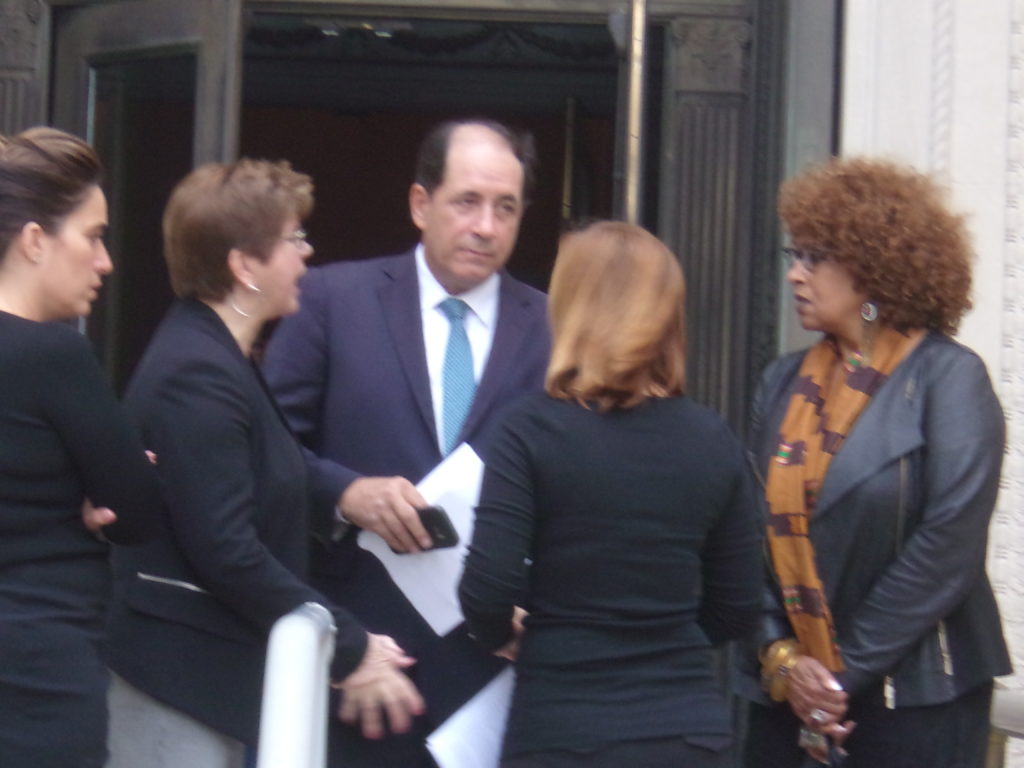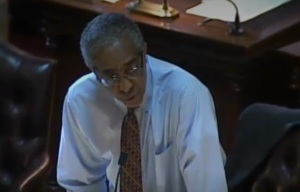Senate Health Committee Passes Both Medical Marijuana and Expungement Bills

The Senate Health and Human Services Committee this morning passed both medical marijuana (S-10)
[caption id="attachment_55038" align="alignright" width="300"] Rice voted yes on both bills.[/caption]
Rice voted yes on both bills.[/caption]
and expungement (S-3205) bills out of committee.
S-10 went through with full support.
S-3205 passed out of committee with Sweeney, Vitale, Codey, Gopal and Lagana voting yes.
Senator Declan O'Scanlon abstained.
"I can't vote for this bill out of committee today. I have to abstain," said the Monmouth Republican, who added that after examining all the late amendments he could probably be persuaded to back the bill on Thursday.
[caption id="attachment_13606" align="alignleft" width="300"] Lagana, left, voted yes on both bills.[/caption]
Lagana, left, voted yes on both bills.[/caption]
Senator Joe Lagana (D-38) explained his rationale for voting in favor of the bills.
"I think it's been proven effective," the senator said of medical marijuana, heralding S-10 for making expansion more accessible.
As for the expungement bill, "I've always been a proponent of decriminalization," the Paramus-based senator said. "I was a public defender, and I represented people arrested for possession. Most of them were young people stuck with a criminal."
Lagana said he opposes a law that sticks people caught with pot with a criminal conviction for the rest of their lives.
"So we're going down the right path," he said.
As for full-blow adult legalization of recreational marijuana, "the voters will decide," he said.
S-10 revises requirements to authorize and access medical cannabis; establishes requirements for institutional caregivers; revises permit requirements for alternative treatment centers; and establishes additional legal protections for patients and caregivers.
Current law provides that up to two ounces of medical cannabis may be dispensed to a patient in a 30-day period. The bill provides that the maximum amount that may be dispensed will increase to two and one-half ounces, and the maximum amount will increase to three ounces. The quantity restrictions will not apply to a patient receiving hospice care or who is terminally ill; other patients may petition the CRC for an exemption from the monthly quantity limits, which may be granted if appropriate to the patient’s treatment needs. The CRC is to establish recommended dosing guidelines for medical cannabis products that are equivalent to one ounce of medical cannabis in dried form.
Current law provides that physicians may issue multiple written instructions authorizing up to a 90-day supply of medical cannabis, provided that each instruction is issued for a legitimate medical purpose, includes the earliest date on which the instruction becomes valid, and does not present an undue risk of diversion or abuse. The bill will allow practitioners to authorize up to a one year supply at one time.
The bill requires the CRC to establish a process for patients to be dispensed medical cannabis in quantities of up to a two week supply during the pendency of the patient’s registration with the CRC; additional two-week supplies may be dispensed until the registration process is completed. The CRC is to establish appropriate restrictions to protect against fraud, abuse, and diversion.
The bill removes a provision that limits access to edible forms of medical cannabis, including oils, to qualifying patients who are minors, and specifies that medical cannabis may be distributed in transdermal, sublingual, and tincture forms, as well as in the forms authorized under current law. Upon dispensing medical cannabis, the medical cannabis dispensary or clinical registrant is to notify the practitioner of the amount, strain, and form of medical cannabis dispensed.
The bill provides that medical cannabis may be dispensed to a patient by any medical cannabis dispensary or clinical registrant in the State; under current law, patients are to be registered with, and may only be dispensed medical cannabis from, a single ATC where the patient is registered. The bill requires that, prior to dispensing medical cannabis to a patient, the dispensary or clinical registrant will be required to access a system currently maintained by the Division of Consumer Affairs in the Department of Law and Public Safety that tracks written instructions for, and dispensations of, medical cannabis, in order to ascertain whether any medical cannabis was dispensed to or on behalf of the patient within the preceding 30 days.
The bill provides that a practitioner or an immediate family member of a practitioner who authorizes patients for medical cannabis may not hold any profit or ownership interest in an ATC. A practitioner or the immediate family member of a practitioner who applies for an ATC identification card is to certify that the practitioner has not authorized any patients for medical cannabis in the preceding 90 days. A person who violates the prohibition will be guilty of a crime of the fourth degree, which is punishable by imprisonment for up to 18 months, up to a $10,000 fine, or both. The bill specifies that nothing in the prohibition will ban any practitioner from serving on the governing board or medical advisory board of an ATC, provided the practitioner receives no special compensation or remuneration from the ATC, including payments based on patient volumes or the number of authorizations for medical cannabis the practitioner issues.
The bill additionally prohibits practitioners from authorizing themselves or members of their immediate family for the medical use of cannabis.
The bill requires the CRC to establish curricula for practitioners and employees of medical cannabis dispensaries and clinical registrants that are designed to assist with patient consultations regarding the form, strain, quantity, and dosing of medical cannabis appropriate to the patient’s qualifying medical condition. Practitioners will be required to complete the health care practitioner curriculum as a condition of authorizing patients for the medical use of cannabis, and employees of medical cannabis dispensaries and clinical registrants will be required to complete the curriculum as a condition of registering with the CRC.
Currently, medical cannabis is subject to the State sales tax. The bill will phase out the sales tax over several years: commencing July 1, 2020, the tax will be five percent; commencing July 1, 2022, the tax will be three percent; commencing July 1, 2023, the tax will be one percent; and commencing July 1, 2024, no sales tax may be assessed against medical cannabis. Any sales tax assessed on medical cannabis is to be exclusively appropriated to programs for the treatment of mental health and substance use disorders.
Senate Bill No. 3205 would revise procedures for expunging criminal and other records and information.
The bill amends N.J.S.A.2C:52-2 to provide that the following categories of persons are eligible for expungement:
- a person who has been convicted of one crime, and does not otherwise have any subsequent conviction for another crime;
- a person who has been convicted of one crime and less than four disorderly persons or petty disorderly persons offenses, and does not otherwise have any subsequent conviction for another crime or for another disorderly persons or petty disorderly persons offense such that the total number of convictions for offenses exceeds three;
- a person who has been convicted of multiple crimes, or a combination of multiple crimes and disorderly persons or petty disorderly persons offenses, all of which are listed in a single judgment of conviction, and the person does not otherwise have any subsequent conviction for another crime or offense in addition to those convictions included in the person’s expungement application; or
- a person who has been convicted of multiple crimes or a combination of multiple crimes and disorderly persons or petty disorderly persons offenses, which crimes or combination of crimes and offenses were interdependent or closely related in circumstances and were committed as part of a sequence of events that took place within a comparatively short period of time (a so-called “crime spree”), regardless of the date of conviction or sentencing for each individual crime or offense, and the person does not otherwise have any subsequent conviction for another crime or offense in addition to those convictions included in the person’s expungement application.
If a person with one or more criminal convictions is eligible as described above for expungement relief, the expungement application may generally proceed so long as one of the following time period requirements is met:
- five years have passed with respect to all aspects of satisfying the most recent conviction (five years from the date of conviction, payment of fine, satisfactory completion of probation or parole, and release from incarceration);
- the payment of a fine, which is currently subject to collection under the State’s comprehensive enforcement program established pursuant to P.L.1995, c.9 (C.2B:19-1 et seq.), is not yet satisfied due to reasons other than willful misconduct, but the five-year time requirement is otherwise met.
- the fine is satisfied, but five years have not passed since doing so, and the five-year time requirement is otherwise met; or
- at least four but less than five years have passed with respect to all aspects of satisfying the conviction (this expedited expungement would also require the person to show that it is in the public interest to permit such expungement). Under the bill, in that instance, the court shall provide for the entry of civil judgment in the name of the State Treasurer and transfer the collection and disbursement responsibility to the State Treasurer for the outstanding amount in accordance with section 8 of P.L.2017, c. 244 (C.2C:52-23.1).
The bill further amends N.J.S.A.2C:52-2 to provide for a “clean slate” expungement. Under this provision, in applicable cases, a person may present an expungement application to the Superior Court if the person has been convicted of multiple crimes or a combination of one or more crimes and one or more disorderly persons or petty disorderly persons offenses, but is not eligible for an expungement under the above provisions.
Under this new provision, the person, if eligible, may present the expungement application after the expiration of a period of ten years from the date of his most recent conviction, payment of fine, satisfactory completion of probation or parole, or release from incarceration, whichever is later. The term “fine” means and includes any fine, restitution, and other court-ordered financial assessment imposed by the court as part of the sentence for the conviction, for which payment of restitution takes precedence in accordance with chapter 46 of Title 2C of the New Jersey Statutes. The person shall submit the expungement application to the Superior Court in the county in which the conviction for the most recent crime was adjudged, which contains a separate, duly verified petition as provided in N.J.S.2C:52-7 for each conviction sought to be expunged, praying that the conviction or convictions, and all records and information pertaining thereto, be expunged. The petition for each conviction appended to an application shall comply with the requirements set forth in N.J.S.2C:52-1 et seq.
Under the bill, notwithstanding the provisions concerning the ten-year time requirement, if a fine which is currently subject to collection under the comprehensive enforcement program established pursuant to P.L.1995, c. 9 (C.2B:19-1 et al.) is not yet satisfied due to reasons other than willful noncompliance, but the time requirement of ten years is otherwise satisfied, the person may submit the expungement application and the court may grant an expungement. Under the bill, if expungement is granted, the court shall provide for the entry of civil judgment in the name of the State Treasurer and transfer the collection and disbursement responsibility to the State Treasurer for the outstanding amount in accordance with section 8 of P.L.2017, c. 244 (C.2C:52-23.1).
The bill deletes the provision in N.J.S.A.2C:52-2 concerning the expungement of convictions for the sale and distribution of a controlled dangerous substance, and possession with intent to distribute. This subsection barred expungement in these categories except in cases involving small amounts of marijuana and hashish, or any controlled dangerous substance where the conviction is of the third or fourth degree. The effect of deleting this provision is that for purposes of expungement, convictions for controlled dangerous substance crimes will be treated the same as other crimes and offenses in terms of eligibility.
The bill amends N.J.S.A.2C:52-3 to provide that the following categories of persons are eligible for expungement:
- a person who has been convicted on the same or separate occasions of no more than five disorderly persons offenses, no more than five petty disorderly persons offenses, or a combination of no more than five disorderly persons and petty disorderly persons offenses, and the person does not otherwise have any prior or subsequent conviction for a disorderly persons or petty disorderly persons offense such that the total number of convictions for such offenses exceeds five;
- a person who has been convicted of multiple disorderly persons offenses or multiple petty disorderly persons offenses, or a combination of multiple disorderly persons and petty disorderly persons offenses, which convictions were entered the same day, and the person does not otherwise have any prior or subsequent conviction for another offense in addition to those convictions included in the person’s expungement application; or
- a person who has been convicted of multiple disorderly persons offenses or multiple petty disorderly persons offenses, or a combination of multiple disorderly persons and petty disorderly persons offenses, all of which were part of a “crime spree” (described in the same manner as above with respect to a spree which resulted in multiple criminal convictions).
The bill’s provisions provide for an automatic expungement of disorderly persons and petty disorderly person offenses as follows:
For any eligible person who files an application for expungement, the Superior Court in the county in which the most recent conviction was adjudged would, within 30 days of the person filing the application, notify relevant law enforcement and criminal justice agencies, including the Superintendent of State Police and the Attorney General, and the Administrative Office of the Courts would include the information required by N.J.S.2C:52-7 for each conviction eligible to be expunged. Upon receipt of the information from the Administrative Office of the Courts the relevant law enforcement and criminal justice agencies would, within 30 days, notify the Administrative Office of the Courts of any inaccurate or incomplete data contained in the information provided by the Administrative Office of the Courts or of any other basis for ineligibility under the bill. Unless the relevant law enforcement and criminal justice agencies provide information about any inaccurate or incomplete data, or any other basis for ineligibility, the Administrative Office of the Courts would promptly provide notice of the person’s eligibility and the Superior Court would issue an order listing the conviction or convictions to be expunged.
The bill does not change the five-year time requirement for expungements for disorderly persons and petty disorderly persons convictions.
The bill would revise the requirements for the statement which accompanies a petition for expungement in N.J.S. 2C:52-8, and the grounds for denial of an application in N.J.S. 2C:52-14, consistent with the revisions to N.J.S.A.2C:52-2 and N.J.S.A.2C:52-3.
The bill would transfer fine collection and disbursement functions to the State Treasurer in instances where expungement is granted under N.J.S.A.2C:52-2, but a fine has not been paid in full.





